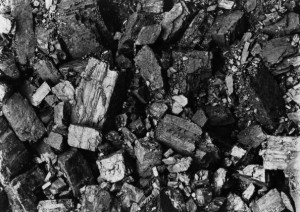El Paso May Become the First Texas City to Go Coal Free

Photo by Cabot/Getty Images
Coal is the dirtiest fossil fuel and the most widely used for power generation.
El Paso’s public utility announced plans to run the city coal-free in two years. It’s a bold proposal since no major U.S. city can run without coal power yet, but it seems possible, and it puts El Paso ahead among Texas cities that have sought to end their dependence on coal.
The announcement mirrors an initiative in Austin. But El Paso, with less investment in coal plants, less dependence on coal power and substantial recent development of other energy sources may find it easier to get out of the coal game completely.
“Our overall portfolio for generation has a very small percentage of coal,” said Eddie Gutierrez, spokesman for El Paso Electric Company. “In our region we have the right kind of sun for the optimal type of solar energy, so moving forward solar energy and cost effective forms of technology is what were going to go with.”
El Paso Electric Company services about 400,000 customers and has doubled its solar power production capacity in the last year. The utility signed a 20-year contract to get power from Macho Springs, a New Mexico solar farm as big as 300 football fields, which started operation in May. They have also started construction on a new natural gas plant.
Austin depends on coal for about 20 percent of its electricity, by comparison coal power only met about six percent of El Paso’s demand in 2012. The utility owns seven percent of the local coal plant. By contrast, Austin Energy owns over a third of the Fayette Power Project. That makes divesting from the plant considerably more complicated.
Austin Energy, Austin’s electric utility, told the City Council that the price of electricity would have to rise by up to 25 percent in Austin to pay off the $260 million the utility still owes in interest and debt on the plant.

Photo by Andy Uhler/KUT News
The Fayette Power Project supplies enough power to meet peak demand of about 406,000 Texans. It sits on a ten-square-mile site a few miles east of La Grange.
That hasn’t stopped Austin from exploring its options. Today a city task force exploring those options is set to vote on new recommendations for Austin City Council.
Among those recommendations is one to concentrate all of Austin’s ownership into one generating unit of Fayette, and then retire that unit.
The plan could go against the city’s partnership agreement with the LCRA, which also owns a stake in Fayette. But the task force thinks that partnership agreement may not have been legal in the first place.
“We don’t have any certainty that we can get out of this thing. But we’re hoping that if we do get control of our own destiny, by getting one of the [units], that certainly we’ll be able to ramp it down if nothing else, so that we can reduce the carbon,” said Michael Osborne, who chairs the task force.
Federal mandates to reduce nationwide carbon emissions by 30 percent from 2005 levels by 2030 will likely steer the state away from coal, the dirtiest fossil fuel. Governor Perry and other state republicans have resisted curtailing fossil fuel energy production saying it would kill jobs and increase dependence on foreign energy.
The first Texas coal plant to close will be San Antonio’s J.T. Deely plant. The mayor announced in 2011 that the plant would close by 2018, 15 years ahead of schedule. In 2013, the closure process was reportedly on schedule.
